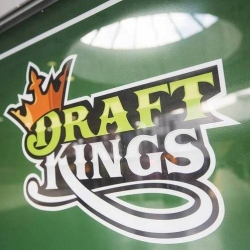DraftKings Casino launched this week, making the daily fantasy sports operator unequivocally a gambling company. DraftKings Casino offers mobile blackjack for Android and iOS devices, but no other casino games at present.
DraftKings Sportsbook launched back in the summer in the New Jersey online gambling industry. The Boston-based DFS operator is a sub-licensee of Resorts Atlantic City, which is best known in the iGaming industry for its New Jersey partnership with PokerStars.
Resorts Casino carries the license for PokerStars and Mohegan Sun, as well. Since 2012, Mohegan Sun has managed the land-based casino operation for owner Morris Bailey.
The launch of its first online casino site completes a several-year transformation for DraftKings from a DFS operator who wanted no ties to sports betting and no regulatory oversight into a company which fully embraces its status as a gambling company.
No DraftKings Poker in New Jersey
Perhaps due to the futility of competing against PokerStars, no plan is in the works for DraftKings Poker. Though it declines to get into the online card playing niche, DraftKings has big plans to become what Legal Sports Report calls an “omni-channel, multi-vertical powerhouse” in other states.
What that means is DraftKings wants to expand its online casino brand across the United States anywhere it is legal and possible. Since late 2011, DraftKings has operated a successful and growing daily fantasy sports business in most US states.
How Daily Fantasy Sports Got Started
Armed with a carveout for fantasy sports in the Unlawful Internet Gambling Enforcement Act (UIGEA) of 2006, DraftKings and its arch-rival, FanDuel, collected several rounds of venture capital to grow into billion dollar companies. The UIGEA carve-out was meant for traditional fantasy sports: local, fan-organized, seasonal competitions among friends and family.
The idea of the exemption was to protect a hobby that 40 million (now over 50 million) Americans played each year. Even some members of the US Congress who passed UIGEA played in fantasy football or Rotisserie baseball leagues, so a carveout seemed harmless.
DraftKings and FanDuel DFS Sites
The law of unintended consequences being what it is, entrepreneurs in the United States, Scotland, and elsewhere had the bright idea to launch sites which offered one-day fantasy contests. Make-believe team owners filled out a starting lineup like they would in their local fantasy leagues, but instead the competition was for one set of NFL, MLB, or NBA games.
Daily fantasy sports proved popular and lucrative. DraftKings, FanDuel, and their lesser known rivals claimed they were not gambling — certainly not sports betting — and their form of gaming was legal under federal law. If DraftKings admitted it was a gambling operator in Nevada, then it might lose its legal status in those states which licensed it for gaming (not gambling) operations.
Few officials or regulators challenged those contentions until 2015, when FanDuel and DraftKings used hundreds of millions of investment dollars to wage an advertising war. The two DFS companies were competing to be the #1 fantasy sports entity in the United States. Once again, the ad war led to unintended consequences. Where the DFS hobby had flown under the radar until 2015, it now began to play out in virtual every US sports broadcast. Late night talk show hosts joked about the commercials, while government officials, lawmakers, state attorney generals, and US attorneys began to take notice.
Why DraftKings Embraced Regulations
The Ethan Haskell scandal, in which a DraftKings employee uses his inside knowledge to place second in a FanDuel contest, caused a sea change in the industry. State attorney generals in Illinois, New York, Nevada, and elsewhere began to question the legality of daily fantasy sports. A Tampa-area US attorney threatened to call a grand jury to study the problem.
Through it all, DraftKings denied its contests were gambling. Faced with state lawsuits and threats of a ban, DraftKings CEO Jason Robins and FanDuel CEO Nigel Eccles chose a different path — they would no longer oppose lawmakers who wanted to regulate the industry.
At first, the DFS companies applied for gaming licenses in states which regulated the industry, but specifically said DFS was not sports gambling. In states like Nevada, where officials demanded licensing as a gambling company, DraftKings and FanDuel declined to operate.
Repeal of PASPA Federal Ban
The transformation was complete when the U.S. Supreme Court repealed the Professional and Amateur Sports Protection Act (PASPA) on May 14, 2018. Individual US states were given the ability to legalize land-based sports betting and single-state live sports betting apps. Since May, five state have legalized sportsbooks and twice that number are debating the prospect.
In the post-PASPA era, DraftKings and FanDuel dropped all pretense their services were not sports gambling. Daily fantasy sports is lucrative, but nothing compared to sports betting. Fans who would not take the time to figure out which NFL field goal kicker or MLB 2nd baseman to start will plop down a lot of money to on whether the Jets beat the Patriots or the Mets beat the Philliies. Almost everyone has an opinion on the outcome of the next game.
DraftKings Casino is the next logical step. If it makes economic sense to be licensed as a sportsbook operator (and thus admit your company takes bets), then it makes sense to be licensed as a casino operator. DraftKings Casino is the culmination of 7 years of evolution for the Boston company started by Jason Robins and friends.

